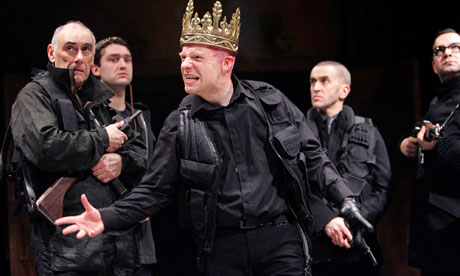Antony Sher
Richard III for the RSC, 1984
In historical terms, it's absolutely fascinating that they've found Richard III – but it doesn't remotely affect the picture we get of him in Shakespeare's play. We've always known it wasn't a historically accurate depiction: Shakespeare was a dramatist, not a historian. So although it might seem as if Richard is coming back to life, this isn't the character we know from the play. This is one of those cases where the fictional account of a person's life has become more famous than the real one.
With Richard, Shakespeare created one of the all-time bad guys in drama. He also created one of the great black comedies: Richard's behaviour in the play is so outrageous. In real life, if you were to meet someone like that, you'd run a mile. But in the safety of the dark auditorium, we love watching Richard, and everything that he gets up to.
When I played Richard, I did a lot of research – a process I then wrote about in my book Year of the King. I was trying to find a way of inspiring myself to play a role that had so famously been played by [Laurence] Olivier: the bastard had gone and put it on film as well, so people all round the world could do impressions of Olivier's Richard III. Later, I would discover that all Shakespeare's great roles have had famous interpretations by famous actors, and this is just part of the job. But at that time I was obsessed with trying to find my own way of playing Richard.
First, I looked at the history to find out how much of Shakespeare's play was accurate. I discovered that very little of it was, so I didn't really bother with that line of enquiry. Instead, I became very interested in the fact that Richard is a severely disabled man. Some actors underplay this – but if you read Richard's opening speech about himself, he is clearly disabled, and has experienced a lot of prejudice, a lot of hatred. This, in turn, has filled him with self-hatred. It's this that enables him to do such evil to other people. He was used to hatred as a disabled man in an un-PC society. There were no Paralympics then.
As part of my research, I went to homes for the disabled, meeting disabled people and looking at various disabilities. I also became very interested in the psychological aspects of various murder cases – above all, that of Dennis Nilsen. He seemed an interesting model for Richard, in that he was a very intelligent man and a witty man, and he had some of Richard's black humour. Studying that case helped me to understand Richard psychologically.
Were I to play Richard again, now he has been found, I wouldn't play him any differently. Regardless of the historical portrait that emerges from the discovery, you can't play Shakespeare's play any differently from the way it is written. It would be a real shame if you tried to: you'd take away all the fun.
Reading on mobile? Click here to watch video
Jonathan Slinger
Richard III for the RSC, 2006–08
When I was researching the role, the biographies weren't much help: they all start by saying that you should forget what you know from Shakespeare's play. But what's fascinating is how the dig is changing all that. Some historians claim Richard wasn't disabled at all, whereas the skeleton suggests that his spine was badly curved. I've always been struck by his anger as a character, and in the play he explains that this is because he was born so physically disadvantaged. That wasn't something Shakespeare invented – and so perhaps the play isn't the Tudor propaganda hatchet job that people often assume. Maybe there are other truths that are still to come to light, truths closer to the ones Shakespeare gives us.
What the biographies and the play do agree on is that Richard was fearsome on the battlefield. Our production was in contemporary dress, but we used medieval swords, and it's interesting to find out how many injuries the real Richard sustained: the wounds to the head, the cuts to the base of the skull and the jaw. Presumably he must have come off his horse. Again, Shakespeare seems to have been right about that: one of the most famous scenes he ever wrote is Richard staggering around yelling: "A horse, a horse! My kingdom for a horse!" I love the idea that he didn't imagine that moment.
When you play Richard on stage, you have to decide how you want him to look. I had a withered left arm, my left leg was in callipers, and I had a huge birthmark across my face, because there's a lot of talk in the play about the circumstances of his birth. The idea was that from one side he'd look almost completely normal, and then he'd spin around and everything would be twisted. Whether he actually looked like that, of course, is something archeology can't tell us.
But maybe that's the point. I spent a long time with Richard – two years in the end, because we were doing the full cycle of the history plays. Across the three plays in which he appears, Shakespeare gives you not just a picture of how someone's mind can become distorted, but also how he's a master of duplicity. He's brilliant at pretending to be one thing while in fact being another, and at saying one thing while meaning something completely different. He's the consummate actor, the ultimate politician. He's continually changing shape.
I'm enjoying the fact that all this means that Richard will have his moment one last time. I heard a rumour that some people want him to have a state funeral. He'd have loved that.
Dominic Dromgoole
Artistic director, the Globe theatre
Richard III is a supercharged panto/tragedy, in the course of which – through sheer energy and gleeful invention – Shakespeare found a new voice. Before him, history plays had been quite broad, jingoistic and merrily crude. Although Richard III is frequently attacked as a melodramatic and simple-minded play, it is psychologically very acute – both in the way that it shows how a sociopath can move through normal society with terrifying ease; and in its portrait of Richard's own deadened, blank sense of himself. It achieves something few other plays had done before – particularly in his internal monologue on the night before the Battle of Bosworth. But what that very important moment in theatrical history has to do with the real Richard III, or with the extraordinary discovery of his bits and pieces in a Leicester car park, I don't know.
Simon Russell Beale
Richard III for the RSC, 1992
I think it's rather sad news. My first reaction was: that poor man. He didn't have a very happy life, and he ended up under a car park. What I feel sad about it is that it doesn't change anything, not really.
I didn't do any historical research when I played the part, for obvious reasons: it's a fiction. You leave all that well alone. In Richard, Shakespeare created a monster – but he is a monster in a world that is equally monstrous. Medieval politics can't have been fun: it's a vision of a world of violence and lack of moral scruple. He doesn't have the isolated malice of an Iago; Richard has a bout of conscience right at the end, which Iago doesn't. He just played the game. And then once the crown is on his head, it's not as much fun as he thought it was going to be. After that, he is more weighted with desperation, tiredness and seriousness.
There have been a lot of great Richard IIIs. When I did it, the Observer ran a story with a list of all the greats of the last century. It hadn't occurred to me till then; I had a terrible stomach ache suddenly, and had to go off to have a warm bath. Ian Holm was the big RSC one everyone talked about, and Ian McKellen was on at the same time as me, or just before.
It's interesting that they think he did have a curvature of the spine. I wanted him to have the shape of a retired American footballer: very big and heavy, with a huge upper body compared to his legs, and a tiny bald head. People said I looked like Shakespeare's "bunch-backed toad", as his mother calls him. His disability is incredibly important to the play – it's a motor for his fury. Will I be going up to Leicester? Well, I think I might.













